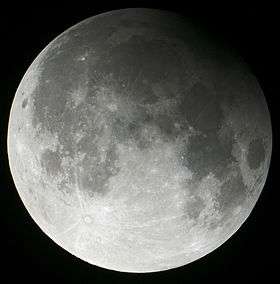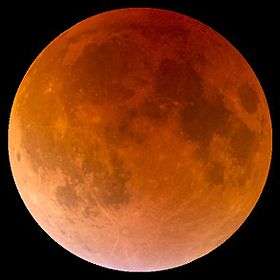August 1989 lunar eclipse
| Total Lunar Eclipse February 20, 1989 | |
|---|---|
| (No photo) | |
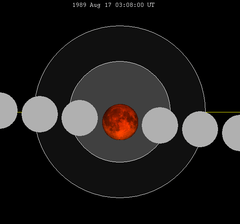 The moon passes west to east (right to left) across the Earth's umbral shadow, shown in hourly intervals. | |
| Series | 128 (39 of 71) |
| Duration (hr:mn:sc) | |
| Totality | |
| Partial | |
| Penumbral | |
| Contacts | |
| P1 | UTC |
| U1 | |
| U2 | |
| Greatest | |
| U3 | |
| U4 | |
| P4 | |
 The eclipse occurs in Capricornus | |
A total lunar eclipse took place at 0308 UT (GMT) on August 17, 1989, the second of two total lunar eclipses in 1989.
The moon passed through the center of the Earth's shadow.
Visibility
It was seen completely over South America, and rising over North America, and setting over Africa, and Europe.
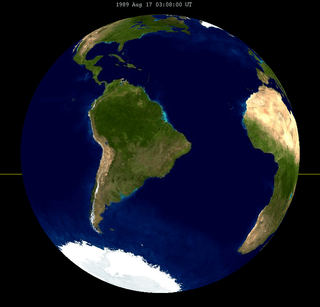
Relations to other lunar eclipses
Lunar year series
This eclipse is the second of four lunar year eclipses occurring at the moon's ascending node.
The lunar year series repeats after 12 lunations or 354 days (Shifting back about 10 days in sequential years). Because of the date shift, the Earth's shadow will be about 11 degrees west in sequential events.
| Descending node | Ascending node | |||||
|---|---|---|---|---|---|---|
| Saros | Date | Type Viewing |
Saros | Date Viewing |
Type Chart | |
| 113 | 1988 Mar 03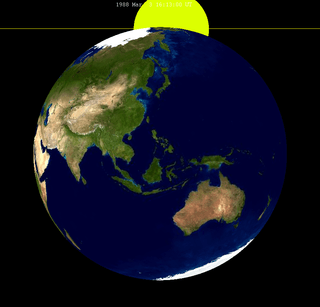 |
Penumbral |
118 | 1988 Aug 27 |
Partial | |
| 123 | 1989 Feb 20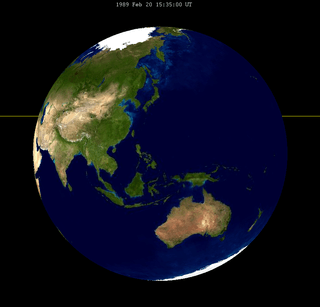 |
Total 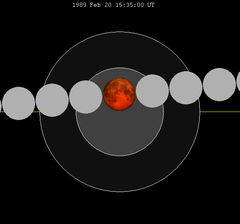 |
128 | 1989 Aug 17 |
Total | |
| 133 | 1990 Feb 09 |
Total |
138 | 1990 Aug 06 |
Partial | |
| 143 | 1991 Jan 30 |
Penumbral |
148 | 1991 Jul 26 |
Penumbral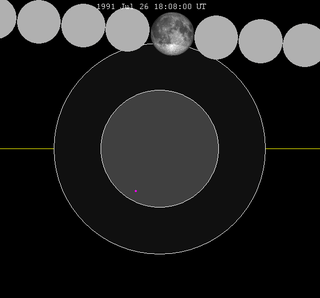 | |
| Last set | 1987 Apr 14 | Last set | 1987 Oct 07 | |||
| Next set | 1991 Dec 21 | Next set | 1991 Jun 27 | |||
Saros series
Lunar saros series 128, repeating every 18 years and 11 days, has a total of 71 lunar eclipse events including 11 total lunar eclipses.
| Greatest | First | |||
|---|---|---|---|---|
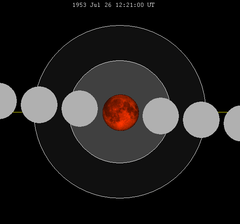 The greatest eclipse of the series occurred on 1953 Jul 26, lasting 108 minutes.[1] |
Penumbral | Partial | Total | Central |
| 1304 Jun 18 | 1430 Sep 2 | 1845 May 21 | 1899 Jun 23 | |
| Last | ||||
| Central | Total | Partial | Penumbral | |
| 2007 Aug 28 | 2097 May 21 | 2440 May 17 | 2566 Aug 2 | |
| 1917 Jul 4 | 1935 Jul 16 | 1953 Jul 26 | |||
 |
 |
 |
 |
 |
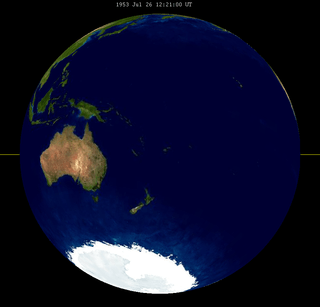 |
| 1971 Aug 6 | 1989 Aug 17 | 2007 Aug 28 | |||
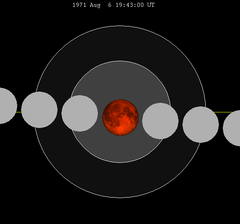 |
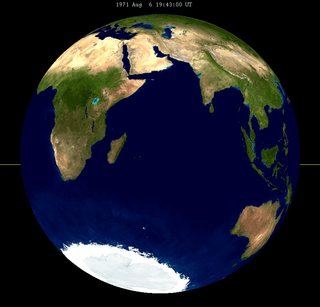 |
 |
 |
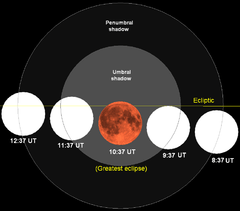 |
 |
| 2025 Sep 7 | 2043 Sep 19 | 2061 Sep 29 | |||
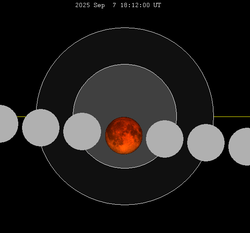 |
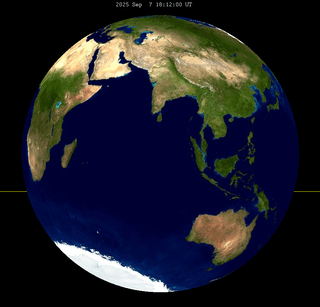 |
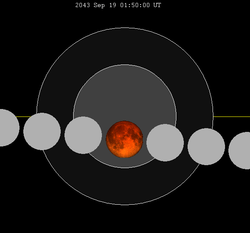 |
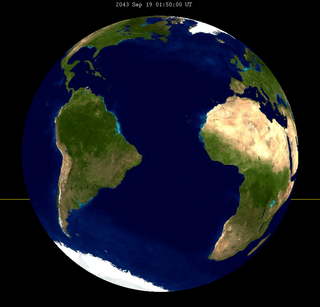 |
 |
 |
| 2079 Oct 10 | 2097 Oct 21 | ||||
 |
 |
 |
 | ||
Metonic series
It is the third of five Metonic cycle eclipses, each being separated by 19 years: The Metonic cycle repeats nearly exactly every 19 years and represents a Saros cycle plus one lunar year. Because it occurs on the same calendar date, the earth's shadow will in nearly the same location relative to the background stars.
| Descending node | Ascending node | |||||
|---|---|---|---|---|---|---|
| Saros | Date | Type | Saros | Date | Type | |
| 103 | 1951 Feb 21 | Penumbral | 108 | 1951 Aug 17 | Penumbral | |
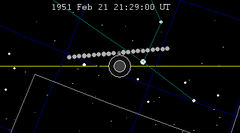 |
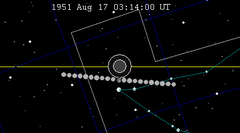 | |||||
| 113 | 1970 Feb 21 | Partial | 118 | 1970 Aug 17 | Partial | |
 |
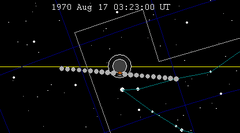 | |||||
| 123 | 1989 Feb 20 | Total | 128 | 1989 Aug 17 | Total | |
 |
 | |||||
| 133 | 2008 Feb 21 | Total | 138 | 2008 Aug 16 | Partial | |
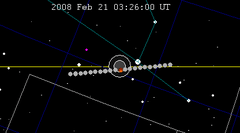 |
 | |||||
| 143 | 2027 Feb 20 | Penumbral | 148 | 2027 Aug 17 | Penumbral | |
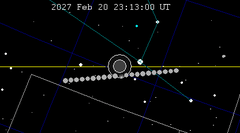 |
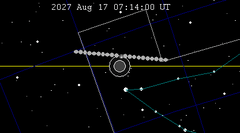 | |||||
Tritos series
The tritos series repeats 31 days short of 11 years at alternating nodes. Sequential events have incremental Saros cycle indices.
This series produces 23 total eclipses between June 22, 1880 and August 9, 2120.
| Ascending node | Descending node | |||||
|---|---|---|---|---|---|---|
| Saros | Date Viewing |
Type chart |
Saros | Date Viewing |
Type chart | |
| 119 | 1902 Apr 22 |
Partial |
120 | 1913 Mar 22 |
Partial | |
| 121 | 1924 Feb 20 |
Partial |
122 | 1935 Jan 19 |
Partial | |
| 124 | 1945 Dec 19 |
Partial |
125 | 1956 Nov 18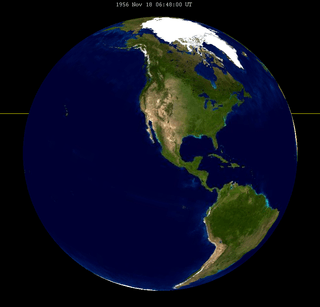 |
Total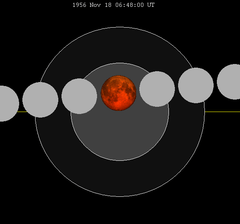 | |
| 126 | 1967 Oct 18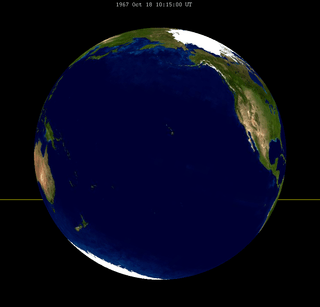 |
Total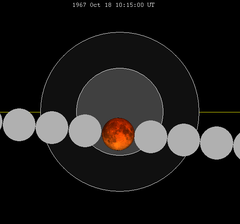 |
127 | 1978 Sep 16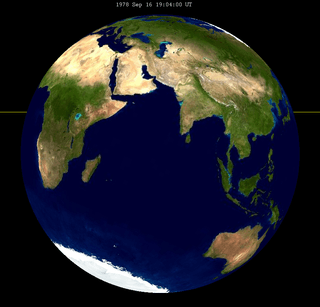 |
Total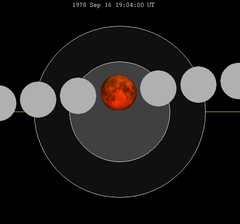 | |
| 128 | 1989 Aug 17 |
Total |
129 | 2000 Jul 16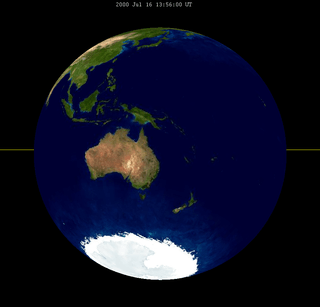 |
Total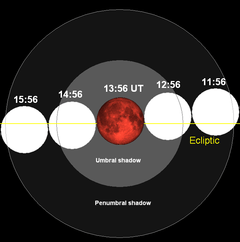 | |
| 130 | 2011 Jun 15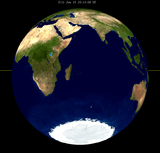 |
Total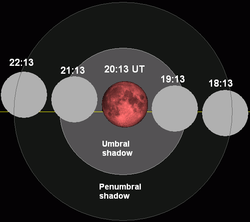 |
131 | 2022 May 16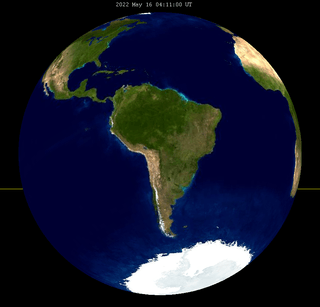 |
Total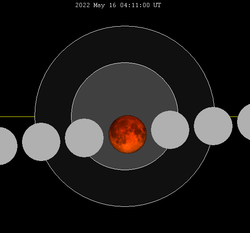 | |
| 132 | 2033 Apr 14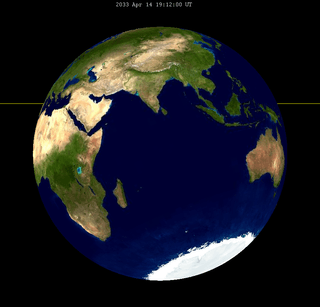 |
Total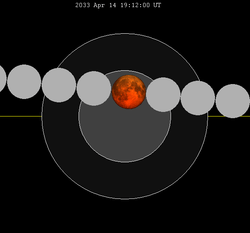 |
133 | 2044 Mar 13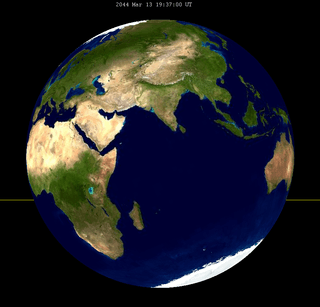 |
Total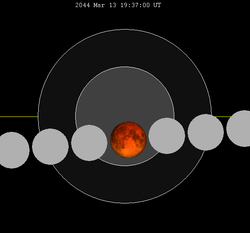 | |
| 134 | 2055 Feb 11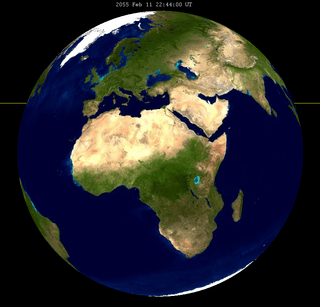 |
Total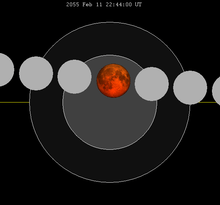 |
135 | 2066 Jan 11 |
Total | |
| 136 | 2076 Dec 10 |
Total |
137 | 2087 Nov 10 |
Total | |
| 138 | 2098 Oct 10 |
Total | ||||
See also
Notes
External links
- 1989 Aug 17 chart Eclipse Predictions by Fred Espenak, NASA/GSFC
| Wikimedia Commons has media related to Lunar eclipse of 1989 August 17. |
